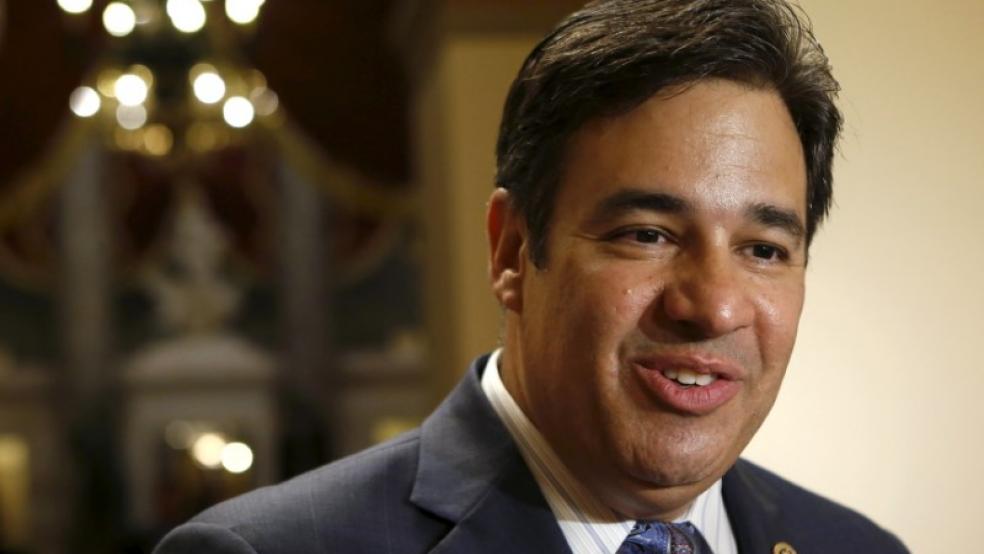The Republican plan to push major corporate tax cuts through Congress as part of a budget reconciliation plan could run into some problems unless it also includes some pretty major changes to corporate tax credits and conditions on the repatriation of income held overseas.
Budget reconciliation measures allow a bare majority in the Senate to pass a bill without having to assemble a large enough coalition to vote down a filibuster. However, one price of using reconciliation is that legislation passed under its rules cannot add to the federal deficit in years outside the 10-year “budget window.”
Related: The Basic Problem With Trump's Huge Tax Cut
That’s a huge impediment to the plan currently under consideration because if the White House-proposed corporate tax rate is reduced from 35 percent to 15 percent, it would almost certainly blow up the federal deficit. And its impact could be felt well beyond the 10-year budget window, even if the tax cut is scheduled to “sunset” after a fixed period of time.
That’s the case for at least two reasons.
First, businesses have considerable flexibility when it comes to timing their use of various tax credits available to them. For example, a company with a net operating loss in a given year can use that loss to offset taxable profits in other tax years, going back as far as five years or forward as far as 20.
For example, if a company is carrying a loss forward on its books, it might prefer not to claim it in a year when its tax rate was only 15 percent, especially if it knows that the corporate tax rate is scheduled to rocket back up to 35 percent in the future. Instead, it could hold on to the credit, using it to lower its tax bill sometime in the future, well outside the 10-year budget window.
Another problem is the impact a large temporary cut might have on the repatriation of profits held overseas. The US currently taxes the profits of US companies regardless of where in the world they earn money. While taxes paid to foreign governments are deductible, the balance of the 35 percent US rate becomes payable when the money is returned to the US. This leads many countries to delay repatriation for as long as possible.
Related: How Trump’s Tax Cut Plan Would Blow Up the Deficit
If there were a sudden 20-point drop in the corporate tax rate, particularly one with a pre-identified expiration date, it would lead some companies to accelerate the repatriation of profits that would otherwise have remained overseas indefinitely. Inevitably, some of those profits would otherwise have stayed abroad and been brought home outside the budget window, triggering the old 35 percent tax rate.
The Joint Committee on Taxation illustrated both problems in a short letter to House Speaker Paul Ryan, which Ryan released on Tuesday. Ryan had requested an analysis of the revenue impact that lower the corporate rate to 20 percent for three years would have on tax revenues. The JCT found that the impact on the would result in $489.7 million less in taxes paid to the Treasury over the course of ten years.
Significantly, though, the JCT noted that the effect would last longer than that.
“We project a non-negligible revenue loss in the tax years immediately following the budget window notwithstanding the temporary nature of the tax reduction,” read the letter signed by JCT Chief of Staff Thomas A. Barthold. “This is due largely to an increased amount of credits becoming eligible to be carried forward into tax years following 2020 and the lowering of the repatriation baseline resulting from a temporary increase of repatriation of foreign earnings during the period of reduced tax.”
Related: Why Pro-Business Republicans May Not Embrace Trump’s Massive Tax Cut
That “non-negligible revenue loss” means that it would add to the deficit in violation of the reconciliation rules. Presumably, an even larger cut, such as the one proposed by Trump, would have a correspondingly larger effect, particularly if it were scheduled to last through all or most of the 10-year budget window. This would open the proposal up to criticism from Democrats that the plan violates the Senate’s restriction on increasing the deficit with budget reconciliation legislation.
The alternative would be a tax cut that expires after two years -- something George Callas, senior tax counsel to Speaker Ryan, said would be a terrible idea during remarks at the Institute for International Finance last week.
“A corporate rate cut that is sunset after three years will increase the deficit in the second decade -- we know this,” Callas said. “Not 10 years. Three years. You could not do a straight-up, un-offset, three-year corporate rate cut in reconciliation. The rules prohibit it. You might be able to do two years.”
However, he continued, “A two-year corporate rate cut...would have virtually no economic effect. It would not alter business decisions. It would not cause anyone to build a factory. It would not stop any inversions or acquisitions of U.S. companies by foreign companies. It would just be dropping cash out of helicopters onto corporate headquarters.”





